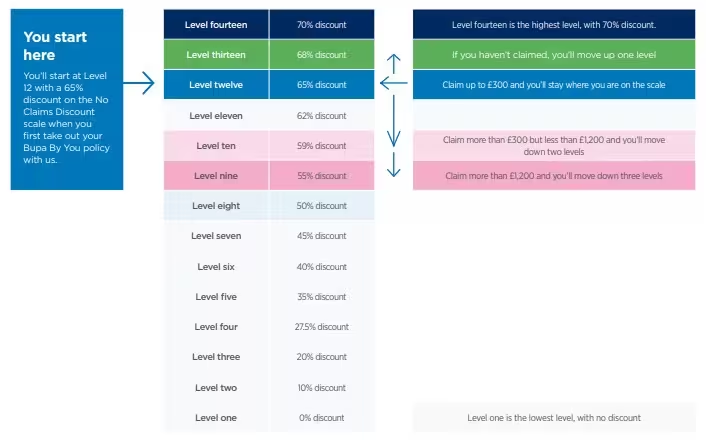What does Bupa offer in terms of mental health cover?
Bupa is undoubtedly the best-known private health insurer in the UK, with more members than any other insurer. In this article, we'll focus on their mental health offering, explaining what's included, how it works, and why Bupa's mental health cover stands out.


Introduction to Bupa mental health cover
Uniquely, Bupa includes mental health cover as standard with their Bupa By You health insurance plans. Unlike other insurers in the market, where mental health cover is an add-on, it comes with both their Treatment and Care and Comprehensive policies.
Bupa Treatment and Care: what mental health cover is included?
Treatment and Care is Bupa's entry-level health insurance plan designed to help once you've been diagnosed with a condition. In relation to mental health, you can access 28 days of inpatient or day-patient psychiatric care each year for each policy member. This means if you need to be admitted to a hospital after your mental health diagnosis, you'll be covered for a set amount of days.
Bupa Comprehensive: what mental health cover is included?
Bupa's Comprehensive cover offers the same level of in and day-patient psychiatric care as Treatment and Care. It also includes out-patient consultations with mental health specialists up to your chosen out-patient limit.
Bupa operates on a 'combined limit per person, per year' basis, meaning all out-patient services fall under one limit, with each person on the policy having their own individual limit. However, these limits don't apply if your out-patient care is for eligible cancer treatment.
Related guides:
Bupa offers cover for numerous mental health issues and disorders, stating on their website that they cover more conditions than any other UK insurer. These include:
A key feature included in both plans - both directly and indirectly related to mental health - is Bupa's addiction treatment programmes. These programmes support a range of addictions, including alcohol, drugs or gambling, with each policy member being eligible for one programme during the lifespan of your policy.
While Bupa covers many mental conditions, there are some exclusions to be aware of.
Treatment of and support for those suffering from Dementia are excluded from Bupa health insurance policies, which is the same with all health insurance companies in the UK. The primary reason for the exclusion is that all health insurance policies are there to help people get back to where they were following an acute illness. Unfortunately, dementia is typically a chronic condition that needs careful management.
Bupa also excludes learning, behavioural and developmental conditions such as Asperger, ADHD and dyslexia for similar reasons, in that they need long-term care and management, not short-term treatment.
Are pre-existing conditions covered?
Pre-existing conditions are those that exist prior to applying for your policy. Most insurers - including Bupa - don't cover these conditions; instead, they base their cover on future health conditions that may arise.
Depending on which underwriting method you opt for, you may need to tell Bupa about any existing mental health conditions before taking out a policy. If you opt for moratorium underwriting, you won't need to tell Bupa about pre-existing mental health conditions, but anything you've suffered from in the past five years will be automatically excluded.
Remember, though - don't assume you're eligible to claim for these conditions just because your insurer hasn't asked about them; if you claim, your insurer will look into your medical history.
Exceptions to the rule on exclusions and pre-existing conditions
If you're unsure whether your policy covers your condition, speak to your insurer. Although they might state that a certain condition isn't covered, there may be exceptions, including covering you for conditions associated with your excluded condition. Here's an example that Bupa has included in its policy documents:
"If you've had PTSD before, we could still cover you for future unrelated episodes of stress."
'Any conditions, special conditions, pre-existing conditions, moratorium conditions, conditions or symptoms, illnesses or injuries you had before your policy started aren't usually covered.
Bupa offers members several ways to access care, from hands-on self-referral options to hassle-free guided pathways.
Bupa direct access
Bupa's Direct Access service lets you bypass your GP and receive certain mental health treatment without a referral. It's a phenomenal option if you're looking for immediate well-being support but don't have time to wait for GP appointments or referrals.
When using the service, you'll be connected with a trained mental health practitioner who will listen and help you understand your options. You'll have access to guidance and helpful resources; you may even be referred for online CBT (cognitive behavioural therapy), counselling or psychiatric consultation if required.
Open referral
Bupa also gives you access to care via open referral from your GP. This means that your GP chooses the type of specialist suited to your condition, and Bupa helps you find a relevant specialist covered by your policy.
Guided care
Bupa offers Guided Care as part of their open referral process - aiming to give customers a clear, affordable route to consultations, tests and treatments.
In choosing this option, you'll be given a choice of three Bupa-recognised consultants, selected based on your age and location. This approach aims to prevent the hassle of obtaining multiple referral letters if your first choice of consultant doesn't work out.
Opting for Guided Care usually reduces the cost of your premiums, as Bupa has more control over the specialists you'll see. If you want more freedom to choose your own specialist, you don't have to add Guided Care to your policy; just bear in mind this will likely increase your premiums.
Private healthcare insurers often have a network of hospitals and clinics that their customers can use should they require diagnosis, treatment or consultation. Bupa is no exception, building its network based on facilities with a reputation for high standards of care.
Hospital lists
Bupa offers three levels of network access; Essential Access, which includes a number of private facilities across the UK, with the exception of those in London. They also offer Extended Choice and Extended Choice with Central London, which are priced higher due to the location and reputation of their hospitals.
Unlike other insurers, Bupa lets you opt for both guided care and a hospital list if you wish, which means you know which hospitals you can use, and Bupa will recommend specialists at those should you need them. Other insurers typically bundle hospitals and specialists into their guided option, meaning they will tell you which hospitals you can use and the specialists too. In short, Bupa gives you more choice in this respect.
Bupa By You policies are packed with extras that add value to an already excellent package. But do these additions support customer well-being? Let's take a look.
24/7 HealthLine
All Bupa By You policy members can access a 24/7 HealthLine, giving you unlimited telephone consultations with Bupa's specialist team of nurses and GPs. This means if you need immediate support around your mental health and wellbeing, you don't have to wait.
To complement this service, you'll also have access to their Family Mental HealthLine, designed to support parents or carers of young people who are worried about their child's behavioural changes. As a bonus - your child doesn't need to be covered by the policy for you to receive guidance from Bupa's mental health advisers.
MyBupa
Smartphone users will find the MyBupa app a useful addition to their policy, giving them access to their policy details without needing to wait on the phone or log into a computer.
Where many insurers' digital services are limited in the actions you can perform, MyBupa lets you view your policy documents, search for ideal consultants and even manage your claims under one roof.
As part of the MyBupa app, you'll also have access to Bupa's Digital GP service, allowing you to attend or schedule free video or phone appointments with a mental health nurse.
Menopause Healthline
While menopause isn't a mental health condition, its symptoms have been shown to impact wellbeing. Bupa's Menopause Healthline allows policy members to access support and advice from specially trained nurses. Through this, they can discuss the impact of their conditions and explore options to support them in the future.
As mental health cover is included as standard in Bupa's health insurance policies, breaking down its cost is difficult. The cost of health insurance, however, hinges on a few variables, including age, location, lifestyle, the level of cover you select, and who you choose to include.
Our article titled 'How Much Does Bupa Health Insurance Cost?' explored this in detail, showing that the average Bupa health insurance policy costs around £75 per month. Our analysis was based on the typical health insurance buyer and included Comprehensive cover, with £1000 out-patient cover and the Essential Hospital List.
Does it cost more to add mental health cover?
Most insurers offer a base policy with the choice to include additional options. Your basic policy starts at a set cost, increasing with each addition you make. Some providers include a base level of mental health cover, which can be increased at cost depending on your needs.
Bupa does things differently, offering mental health cover as part of their Bupa By You policies. This means you won't pay a penny extra for your mental health cover with Bupa.
Will claiming for mental health conditions affect my premium?
Making a claim will likely increase your policy's cost at renewal. This applies to all conditions covered on your plan, including mental health. With Bupa, the amount your policy increases each renewal is governed by their No Claims Discount (NCD) scale.

This scale helps Bupa calculate the cost of your policy by looking at the amount and value of claims made in the previous policy year. Bupa's scale comprises fourteen levels, with new policyholders starting at Level twelve, which gives them a 65% discount on their base premium.
Example: If you haven't claimed in the past policy year, you move up the NCD scale, resulting in a lower premium. However, if you have claimed a value of between £300-£1199, you would move down the scale by two levels, leading to a higher premium at renewal.
Disclaimer: Changes apply to new Bupa By You health insurance policies. Existing members will benefit after their next renewal.
Right away, assuming it's for a condition that has come on after you took out the policy. You can claim for treatment as soon as your policy begins, but bear in mind that insurers will usually want to check you're not claiming for a pre-existing condition, especially if the claim happens very quickly after getting a policy. You'll also have access to Bupa's Anytime and Family Healthlines, should you require immediate support or guidance around your mental health.
If you're unsure of your policy start date, you'll find it in the welcome documentation you received after your application was approved. Failing that, you can find out more by contacting Bupa or logging into your policy portal.
In short, it is. Bupa health insurance policies offer a comprehensive approach that includes mental health cover as a standard. You don't have to worry about pricing up policy add-ons; apply and enjoy the benefits.
Pair this with an impressive list of conditions and treatment options and you've got a contender for the UK's 'most complete' mental health cover.
Want to know how other insurers’ mental health cover stacks up against Vitality? Read our article on what does Vitality offer in terms of mental health cover?
What our readers say
We are rated Excellent on Google from 150+ reviews. Our reviews relate to the service provided by both myTribe and its partners.
Disclaimer: This information is general, and what is best for you will depend on your personal circumstances. Please speak with a financial adviser or do your own research before making a decision. The brokers we work with provide a comparison service from a panel of some of the UK’s top health insurers. Not every broker works with all the insurers listed in our guides.











